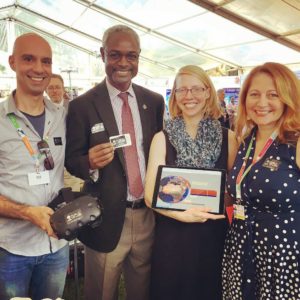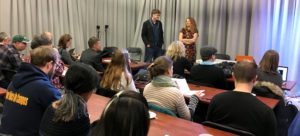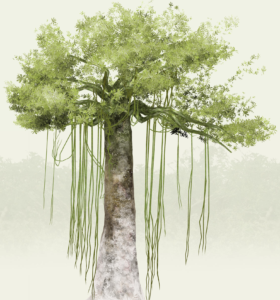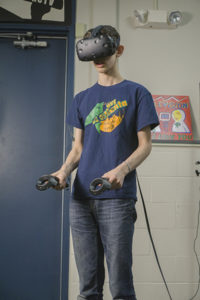PRESS RELEASE MAR 22, 2018 09:00 EDT
(BROOKLINE, Mass., March 22, 2018) Launching March 22nd online and in virtual reality, the United Nations Environment Programme (UNEP), Brookline Interactive Group (BIG), The Public VR Lab, and Datavized Technologies are pleased to announce the public launch of “There’s Something in the Air,” a VR data visualization experience exploring air pollution and global data over time around the globe. The public launch coincides with the official launch of Datavized’s closed beta platform at the Data for Development Festival, the inaugural gathering of the Global Partnership for Sustainable Development Data in Bristol, March 21-23 and will be on view in the VR Data Play Space along with access to Datavized software tools and at the festival and the Bristol Data Dive on March 23.
The visualization, powered by Datavized WebVR software, was presented by the Public VR Lab’s team at the third session of the United Nations Environment Assembly “Towards a Pollution-Free Planet” of the United Nations Environment Programme (UN Environment) in Nairobi, Kenya on Dec. 4-6, 2017 to 800-1000 UNEA delegates, volunteers, NGOs, students, businesses, activists and world leaders, helping them to experience and understand environmental data stories in a new way.
The collaborative project was spearheaded by the UNEP, Brookline Interactive Group, The Public VR Lab, The EcoLearn Project, and Datavized Technologies to demonstrate how VR can create a paradigm shift to a more hands-on, visceral understanding of environmental issues through immersive data storytelling, and the physical sense of presence and increased empathy that VR provides. “There’s Something in the Air” presents estimates of air pollution based on fine particulate matter (PM2.5) and mean annual exposure by country every five years from 1990-2010 and yearly between 2010 and 2015. Data sources include the Health Effects Institute – State of Global Air.
“We want to inspire local communities to craft their own collaborative, immersive storytelling and visual data experiences, and to then be able to share their experiences and data with other communities around the world, with compelling, visceral and visual storytelling around critical issues in the public interest.”
-KATHY BISBEE, CO-FOUNDER AND EXECUTIVE DIRECTOR AT THE PUBLIC VR LAB
“The response of over 800 UNEA delegates and world leaders was absolute raw delight and enthusiasm for their experience of virtual reality. From the seven-year-old environmental activist, Sasha Bennett, to Ibrahim Thiaw, Assistant Secretary-General at the United Nations Environment Programme (UNEP), all remarked how very real and impactful their virtual reality experience was,” added Ms. Bisbee.

For the past two years the Public VR Lab has provided free community VR demos, launched a VR Academy teaching six different ways to create XR content, and began creating VR/AR experiences in the public interest, working with artists, local museums, education, arts and technical organizations, and with local government. The Lab is training the next generation of creators and environmental educators through a high school job training program, the VR Ecohack, a hackathon focused on mentoring new storycoders, and supporting immersive journalism projects like their collaboration with the Boston Globe’s STAT news team.
In 2018 the Lab launched a national collaborative VR filmmaking project on American immigration/migration stories with 15 community-based filmmakers and organizations from Alaska to Philadelphia, called Immigration in Full Frame. With the goal of accessibility in mind, the Lab recently began providing low-cost VR Demos & Creator Toolkits to libraries, schools, arts organizations, filmmakers, universities, governments, and other cultural organizations to build their capacity to demo VR, create local content, and to show that VR can be accessible and used in the public interest.
“There’s Something in the Air” features a customized visualization of the Datavized software tools scheduled to be released in 2018. Datavized immersive visualization technology, built on the WebVR API, enables users with efficient, easy-to-use, three-dimensional geospatial templates for mapping global, national and city data visualizations. The startup, headquartered in New York, is currently expanding its closed beta program working with pilot partners in industries including government, business, education, transportation, mapping, statistics and sustainable development. Business and individual users can sign up to request access to the beta platform through datavized.com.
“This experience demonstrates how big data and VR can be used together to create an immersive environment for increased understanding and enhanced communication of real-world challenges. We are delighted Datavized geospatial software products and mapping technologies are being used as powerful tools for environmental education, awareness and impact,” Debra Anderson, co-founder and chief strategy officer, Datavized Technologies Inc.
The experience is viewable on any connected device at https://demo.datavized.com/somethingintheair, including mobile, desktop, tablet and in VR through WebVR browsers, including in the HTC Vive, Oculus Rift, Samsung Gear VR, Google Daydream, Google Cardboard and Microsoft Windows Mixed Reality headsets. For details on WebVR browsers and supported platforms, visit webvr.rocks.
“The data collected and experienced through this pioneering VR initiative will inform policymakers on the status of air pollution in their respective constituencies worldwide. We, at UN Environment, hope that this VR experience will help expedite the implementation of the recommendations in the resolution approved at the Third UN Environment Assembly,” said Cristian Mazzei, special assistant to the director of the ecosystem division of the United Nations Environmental Programme.
“The experience we created together represents a new frontier in environmental education, uniting the possibilities of new technologies with the urgency of crises such as air pollution. The leaders exposed to this tool gain a new understanding of the issue, and also an understanding of how emerging technologies can add a vital dimension to education,” said Nir Darom, lead creative designer at the Public VR Lab.

Nir Darom, Lead Creative Designer at the Public VR Lab with the Ibrahim Thiaw, Assistant Secretary-General at the United Nations Environment Programme (UNEP), partner, Amy Kamarainen from EcoMOVE, and Public VR Lab Co-founder/BIG Director, Kathy Bisbee.
About Brookline Interactive Group (BIG):
Brookline Interactive Group (BIG) is an integrated media and technology education center and a community media hub for Brookline, Massachusetts and the region. BIG facilitates diverse community dialogue, incubates and funds hyperlocal storytelling, arts, journalism and technology projects, and serves over 500 youth and adults annually through innovative classes and partnerships. BIG offers extensive multimedia training, VR, AR and 360-video cameras and training, access to high-quality filmmaking equipment, production grants, artists’ residencies, and provides low-cost professional media services to nonprofit organizations, education partners, businesses, and to local government.
About The Public VR Lab
The Public VR Lab, a project of Brookline Interactive Group, is building a global network for a Community VR/XR movement that facilitates public dialogue; provides professional training; empowers community knowledge and creation of 360, virtual and augmented content; offers access to tools, headsets, arcades, toolkits, and professional expertise; and generates locally-focused, broadly impactful, XR experiences in the public interest. www.publicvrlab.com
About Datavized Technologies
Datavized is an immersive visualization platform that makes it easy to turn complex data into fully interactive web experiences. Datavized’s geodata software products provide users with web-based drag and drop tools to effortlessly turn location data in spreadsheets into fully interactive 3D maps for enhanced spatial analysis, visualization and decision making. Datavized works on all platforms and connected devices; including desktop, mobile, tablet, and with virtual reality, augmented reality and mixed reality headsets, enabling users to tell immersive data-driven stories. Datavized Technologies Inc is currently in closed beta and is headquartered in New York. datavized.com
About EcoLearn
EcoLearn is an educational research group at the Harvard Graduate School of Education that explores the use of immersive technologies to support learning about the complexity of ecosystems. EcoMUVE and EcoMOBILE are two products that are freely available for download and use. EcoMOBILE uses mobile devices and augmented reality to infuse real environments with digital resources that engage, inspire and educate people about the complexities of the natural systems that sustain us. ecolearn.gse.harvard.edu
Stay Connected:
datavized.com
Twitter: https://twitter.com/datavized
publicvrlab.com
Twitter: https://twitter.com/publicvrlab
Media Relations
www.publicvrlab.com
Brookline Interactive Group (BIG) / Public VR Lab
Kathy Bisbee
kathy at brooklineinteractive.org
datavized.com
Datavized Technologies Inc
Debra Anderson
contact at datavized.com
Categories: High Technology, Environmental, VR, XR, WebVR
Tags: Brookline Interactive Group, data visualization, Datavized, Debra Anderson, environment, Kathy Bisbee, Nir Darom, Public VR Lab, united nations, virtual reality, VR storytelling, WebVR
Additional Links
 At BIG and the Public VR Lab, one of our primary goals in 2019 is to support community media centers, libraries, museums, youth, arts and cultural organizations, and community-engaged filmmakers to understand, create, and provide community access to emerging media equipment, training, and content in all its forms, continuing to build a field for community-based VR, AR, 360, and MR (XR).
At BIG and the Public VR Lab, one of our primary goals in 2019 is to support community media centers, libraries, museums, youth, arts and cultural organizations, and community-engaged filmmakers to understand, create, and provide community access to emerging media equipment, training, and content in all its forms, continuing to build a field for community-based VR, AR, 360, and MR (XR).










